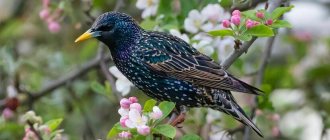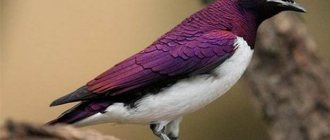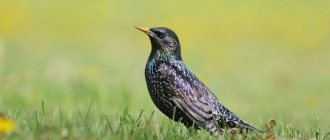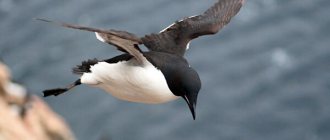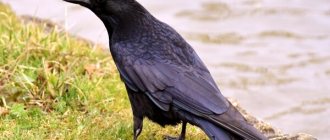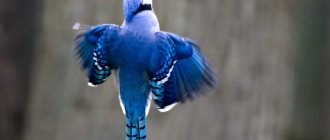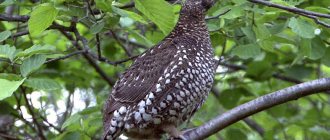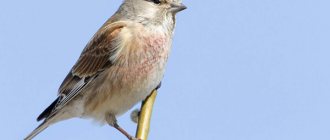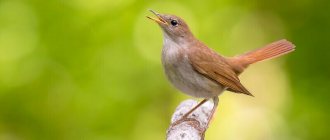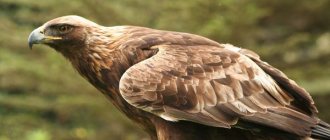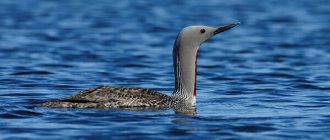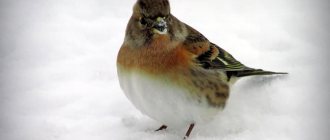Description and features
The starling bird is small in size and is often compared in appearance to a blackbird. The length of the bird is no more than 22 cm, weight is about 75 g, wingspan is approximately 37-39 cm. The body is massive, with dark plumage that shimmers in the sun with small specks of light color, more noticeable in spring in females. A scattering of white or cream spots is especially evident during the molting period, later the plumage becomes almost uniform.
The tail of the birds is short, only 6-7 cm. The color includes a metallic tint. The effect is achieved not due to the pigment present, but to the actual design of the feathers. Depending on the angle and lighting, the color of the plumage changes shades.
In different species of starlings, the tint in the sun can be purple, bronze, green, or blue. The birds' legs are always red-brown, with curved claws.
The bird's head is proportional to the body, the neck is short. The beak is very sharp, long, slightly curved down, flattened on the sides, black in color, but during the mating season it changes color to yellow. The chicks' beaks are only brownish-black. Their youth is revealed by rounded wings, a light neck and the absence of a metallic sheen in color.
There are slight differences between females and males. You can recognize a male by lilac specks on its beak and long feathers on its chest, and a female by its red spots and short gracefully shaped feathers. The flight of starlings is smooth and fast.
Song starlings differ from blackbirds in their ability to run on the ground rather than jump. You can recognize a starling by the way it sings - it often shakes its wings while performing a part.
The ability to imitate the voices of other birds and animals turns an ordinary starling into an extraordinary artist. He can “speak” with the voices of different birds:
- orioles;
- quail;
- jays;
- lark;
- swallows;
- warblers;
- bluethroats;
- thrush;
- ducks, rooster and chicken, etc.
More than once we observed starlings arriving in the spring, singing with the voices of tropical birds. Birds reproduce the creaking of a gate, the clatter of a typewriter, the cracking of a whip, the bleating of sheep, the croaking of marsh frogs, the meowing of cats, and the barking of dogs.
The starling's singing is framed by the shrill squeal of its own voice. Adult birds “accumulate” a repertoire and generously share their luggage.
Listen to the starling's voice
Text of the book “Stories about all living creatures”
Old and small
Today we bought Mishka a new cap... He came to school looking festive and unnatural: every now and then his gap-toothed mouth twitched with a smile. During a short break, all the boys in first grade tried on a cap. During the big break, interest in the update weakened, but by the end of classes they completely got used to it. And the cap lost its value for Mishka, life became everyday again.
After classes, we head home in droves.
On the outskirts, an adult neighbor guy was shooting shot at the gate of the bathhouse, trying out the gun he had just bought. On the doors of the bathhouse a triple circle was drawn with charcoal: he fired at it from twenty steps, from fifty. The whole door was already like a sieve.
A hunched old man in a sweatshirt and a new cap, the same as Mishka’s, sat on a log, correcting this firing. Above them, at a safe distance, a flock of crows and jackdaws screamed frantically.
Soon they began to shoot at the caps, because well-wishers were immediately found:
- Give me mine!
- But you won’t get there! Don't get there! The old man watched the shooting with admiration; crows screamed in the sky. The caps flew up one by one, and Mishka took a long time to attach himself. But then he took a breath of air, plucked up courage, and desperately threw his cap. Bang! – not hit by a single pellet. He threw again as high as possible, then again... Bang! – the cap suddenly jumped in the air, shreds flew in all directions. It turned out that they were not shreds, but paper wads. However, the cap also suffered: they counted six holes...
- I’ll give it up, I’ll give it up! - Mishka says, choking. He looks like a hero again and enthusiastically shows off the holey, gunpowder-smelling renovation. The sad meaning of everything that happened does not immediately dawn on him. His eyes fill with abundant moisture, tears are about to roll down his cheeks. The lips themselves gradually stretch into a horseshoe. Everyone feels that in just a moment Mishkin’s roar will be heard outside the bathhouse.
But then the old man, who had been sitting on a log before, stood up:
- Well, guys, stop throwing things at you! Now it's my turn!
He quickly threw his also new cap into the air. Bang! – the guy had already trained and fired quite passably. The cap was smashed according to all the rules...
The holes are counted all together, and for some reason Mishka’s tears dissolve, the premonition of a great domestic misfortune immediately weakens.
* * *
At home, he bravely endures his fateful moments, for the first time in his life he did not speak. When the storm has subsided, Mishka, shaking his shoulders, sits down to his homework. Then he goes into the hallway, takes a fishing rod and, having dug up worms, goes to the river.
The crows and jackdaws have long since quieted down and settled down in all sorts of places. The old man, now in a border cap brought by his son, goes for pine legs for a broom and stops near Mishka, on the river bridge. The old man's eyes squint cheerfully.
“And if you wanted to freeze, Mishka, you should go home.”
The bear is silent.
- Did you ask me a lot? Look, what a perch, probably took the bait out of turn. And he probably performed maneuvers on a hook, like a rookie. Did you do any maneuvers?
“Yyhy,” Mishka agrees.
- Well, I see that the perch is so big.
The old man carefully placed a single tiny perch on the logs.
Suddenly the float swung sharply and disappeared. The bear crouched down, tugged, and the huge red-finned perch savorily slapped its tail along the bridge deck. The bear quickly re-baited it. A minute later, the same huge perch hung on the hook, then a third, a fourth.
The old man grunted.
- So, Mishka, you… dug up these worms somewhere, behind the barn, or what?
...The next day, when Mishka was at school, the green border cap loomed on the bridge in the morning. But there was no bite, the perches seemed to be a dream.
“You’re old, you’re young,” the grandmother grumbles as she goes to fetch water.
And time takes its course, and autumn is already driving the last crane wedges into the vast sky. Winter and spring will pass, summer will fade away. And soon, very soon Mishka will move to another class...
Vovka-satyuk
So, he rolled up to his grandmother, completely sleepy, because we left the station in the evening, and the road was not close. While grandfather was unharnessing the tired horse, grandmother came out onto the porch and clasped her hands. Vovka no longer saw any of this: he slept in the sleep of a righteous man.
- That's a guest! - Grandfather laughed. - Take him under your white hands, he won’t hear anything.
“If only he’d laid out more grass, the old scoundrel must have shaken the whole guy up.” Oh my angels, your eyes just stick together. – Grandma Katya took Vovka in her arms and carried her into the house.
- A vigorous guy, what will happen to him?
Grandfather took off the bridle, and the warmed bits clattered against the horse’s teeth.
The horse snorted, put his leg aside and immediately began to scratch the grass. And the dew was already ripening on the grass, and the night calmly died down around.
Vovka was put to bed in the closet. It smelled like hay, but again he didn't hear any of it. At night there was a quiet rain, through its steady noise you could hear how the cud crunched and the cow sighed, how a lost mosquito flew in the dark and how the chickens busily changed places. Then everything became quiet.
Vovka had never been to the village before. He dreamed that he seemed to be riding a tricycle, and then went with his father to the zoo and there he rode not on a bicycle, but on a small horse. After all this, he suddenly began to fly through the air, then kicked a rubber camel in the yard.
In the summer, chickens get up earlier than everyone else. It was they who woke Vovka up with their scream, although after he had slept. He sat up in bed and began to remember what happened yesterday, but he wanted to go to the restroom, and the boy went out.
White-breasted swallows were flying in the barn; they sat under the very roof and fed the chicks. Birch brooms hung on the perch, the gate was open, and the sun was shining straight through the gate.
Vovka approached the gate and downstairs, in the garden, he saw his grandfather.
- What, brother, did you get enough sleep? - Grandfather asked. - Well, run to the hut, but now we’ll drink tea.
Grandma Katya came running, found out that her granddaughter wanted to go to the restroom, and led him to the hole that was in the very corner of the street[3]3
R o p e t - roof, roofing.
[Close]. Vovka hesitated for a long time to do the job, perplexed and not believing that this was the latrine, he dared and resolutely began to water the logs.
- Make sure you don't fall off! - said the grandmother, and while Vovka was putting on his sailor suit, she swept the roof with a broom and set the rake to the hayloft.
After that, we washed ourselves from a copper washstand, since there was no tap, and sat down to drink tea.
The house was old and wide, with stables and an entrance, with all sorts of gates and windows.
Vovka walked around the entire house. Grandfather didn’t have anything in store! And all from the forest. The first thing that caught your eye was a large woodpile; it smelled of resin and dried wood. Birch dies, debarked for splinters, were also stacked here. Next, Vovka extracted from his grandfather that thin spruce stakes would be used for a fence, and that thick ones could be used to tear shingles for roofs, that birch ridges would make runners for collective farm firewood, and that a pile of creaky birch bark, yellow on top and white on bottom, would be useful for distilling into tar.
-What is tar?
Grandfather also showed me tar in a clay jar. It was black, like mascara, and thick, suitable for lubricating boots and preparing medicine.
A bird cherry tree grew behind the yard. The grandfather picked berry branches from it and gave it to his grandson; the dark brown astringent berries immediately made Vovkin’s tongue feel like rubber and did not fit in his mouth.
Chickens wandered lazily in the wide burdocks. The high sky was blue, a warm wind blew across the green garden with potatoes and onions. A white butterfly sat on a blade of grass and froze, occasionally fluttering its wings. Grandmother Katya walked to the river with the laundry, followed by the cat Kustik, slowly squinting his eyes.
Grandfather sat down at the porch to hammer the hub for the wheel, and Vovka became thirsty again, and he went into the hut. I drank from a heavy copper ladle, caught my breath and suddenly saw on the wall near the stove a row of sticks written with charcoal. Vovka counted, there were eight sticks. Then he took a coal from the pole and added the same amount, it turned out to be sixteen, and he could count to eighteen, so he added two more. In the end, he wanted to write his name below, but changed his mind and went back to his grandfather.
- Go, brother, go for a walk! - the grandfather told him and began to light a cigarette from his pouch.
Vovka had long wanted to go to the river to see his grandmother, and he ran there. By the way, the cat Kustik was also sitting there.
So Vovka’s first day in the village passed unnoticed.
* * *
And then the days ran quickly and merged into one colorful, rich day that Vovka will remember for the rest of his life. The boy got a tan and settled into his new place, ran far beyond the village to pluck raspberries, and went to haymaking. Now grandfather often took Vovka out for haymaking, especially after that day when Vovka was sitting at home alone.
That day, the grandfather and grandmother did not leave the hayfield for a long time, and Vovka placed a stool next to the clock, climbed on and moved the hands three hours ahead. Out of loneliness, he didn’t know what to do, he cut off the cat’s whiskers, and because of this, Kustik stopped catching mice. In addition, the scissors were lost.
- Well, satyuk! - Grandfather said then. - And who are you born into, such a satyuk?
“Satyuk” sniffled and, without saying anything, creaked his finger on the glass. The scissors were found, the grandfather winked mysteriously at Vovka, and the grandmother was not angry either, especially after one incident.
Here is how it was. In the morning, all the hens took turns sitting in two tubs, where there were liners - wooden testicles carved by grandfather. Each hen, after laying an egg, screamed and cooed throughout the whole house for a long time, waking Vovka up. He jumped up and first of all ran to the tub, took a warm white egg and dragged it to his grandmother. Grandma Katya praised Vovka and stroked his head.
- What, Andeli, did you get enough sleep?
Vovka ran for the other egg. But one day, just on the day when Bush lost his mustache and the grandmother was angry about the scissors, it turned out that one chicken was not put in the tub. Grandma Katya was alarmed.
- Here, my dear, again, like summer, I decided to soar! - she scolded the chicken. - No, in a human way, in a tub, so it’s probably put in a row under the barn!
The grandmother took the grip and began to feel under the barn with the grip. Vovka stood nearby.
- Come on, Vladimer, you’re thinner, climb up and look for a nest there.
Vovka barely got through. It was dark and eerie under the barn, only a small window glowed in the wall. The ceiling, or rather the floor, was so low that even Vovka, with his height, could not straighten up. Vovka was afraid at first and looked back, but Grandma Katya encouraged him.
- Here I am, Vovka, here!
He fumbled around in the dark for a long time and found a nest with eggs. There were twelve of them! Vovka dragged them to his grandmother, she folded them up and took them to the pantry, and he, satisfied, crawled out from under the barn. A button came off his pants, and in the hut the grandmother took a ball of thread and a needle.
- Come on, Andeli, put a thread in your ear; The ear is so tiny, for the life of me I can’t see it. Yes, take off your pants, and I’ll sew on a button.
Vovka threaded the thread, but flatly refused to take off his pants.
- What are you talking about, father! - Grandma Katya spoke. - Is it possible to sew like that! After all, I’ll sew all your memory into your pants. What is it like for Nona to have no memory?
I didn’t want to be left without memory, so I had to take off my pants. Grandmother sewed on a button, albeit a different one, and it was different, and they went to the field to help grandfather dig up hay.
Grandfather and grandmother Katya had just swept away the haystack, and Vovka had just eaten his fill of raspberries, when clouds began to gather. A distant dilapidated church turned white in the blue sky, on the horizon, above the ridge forest, the capricious thunder of an old man turned from side to side, the rye on the roadside wedge died down, the flies became even more annoying - and suddenly everything became quiet. But then a windy chill came running and got entangled in the grass, a real wind blew, and turned over a dry cow dung on the road.
As soon as they ran home, the rain began to pour down, and Grandma Katya closed the chimney, threw a towel over the mirror, hid the samovar in the closet and, in a hurry, placed an empty tub under guard. Sounding rainwater poured into the tub as if from a water pipe.
They sat on the porch - grandfather, Vovka, grandmother Katya, and Vovka was glad that there was so much water all around, but here it didn’t get wet.
“Father, he harnesses his chariot, Ilya the Prophet, and he drives and drives across the sky,” grandmother explained to Vovka.
“Don’t listen to her, Vladimer,” the grandfather interceded, “don’t listen, she’ll tell you a lot of lies.” “And he goes, and he goes”! I would take the feet and go milk the cow.
- Why, old waterman, they haven’t brought in the cows yet.
- “And he goes, and he goes”! Judge for yourself what kind of cart is needed to make such a knock. Who won't believe you?
“Oh, Lord,” the grandmother crossed herself, “I should have been silent.”
- “And he goes and goes”!.. Let's go, Vladimer, to the hut, don’t pay attention to her.
The rain stopped immediately, the cloud moved on, and the sun appeared. A full tub of clean water stood under the fence, the grass near the porch turned greener and smoked, drying out. A round sparrow crawled out from under the roof, chirped twice and flew away on business. Swallows darted joyfully along the street, and a large earthworm diligently crawled across the road. All wet, Bush came running from somewhere, shook himself off and doused Vovka with cold splashes, and the grandmother sent Vovka to pluck onions in the garden bed.
- Don’t pinch, father, from just one bunch, but pinch different ones! - she shouted to her grandson and put on the samovar.
The cows came, the sun set, and the grandmother took Vovka into the closet and tucked a blanket under his sides. He was told to sleep and not to shake his legs, otherwise the baked grandfather would come, put him in a bag and take him away.
So another day passed, and another, but Vovka did not count them.
* * *
Meanwhile, they began to reap rye with a combine, and one day Kustik caught a mouse behind the stove. The cat has grown new whiskers. Bush played with the poor mouse for a long time, until Grandma Katya drove them both away with a broom. Vovka watched with fear for a long time as Kustik moved a half-dead mouse with his paw in the hallway, and when he tried to run away, he was grabbed by the collar again.
Again the white hen started a nest under the barn, and Vovka removed the eggs twice, again there were several thunderstorms and a button was sewn on several times, the onions in the garden began to turn yellow and became tasteless, but the acne-ridden cucumbers and pink carrots ripened.
All this time, neighbor Anna Semyonovna went to her grandmother for milk. Once her grandmother sent Vovka to her to ask for homemade yeast to dissolve the sauerkraut:
- Would you, Vova, go to Senikha, tell me, grandma, would you give me some yeast?
Vovka took the vessel and ran to Senikha. That’s what he called her Senikha. The old woman gave the yeast, but asked:
- Come on, darling, tell me, who taught you to speak like that?
Vovka was silent, and when at home he told about everything, his grandfather burst out laughing, and Grandma Katya began to howl:
- Oh, oh, scoundrel, what have you done! But I told you, call her grandma, what will she think now, oh, oh!..
- Oh yes Vovka-satyuk, what a satyuk! – the grandfather could not calm down and laughed, and Vovka did not understand what was going on.
In the evening Seniha came for milk. She said hello and sat down on the bench. Grandma Katya poured it into her container[4] 4
T a r k a, container - vessel, vessel.
[Close] milk and placed a stick of coal on the wall near the stove.
“Well, mother, how much milk I brought from you, I don’t know how to pay now,” said Seniha.
Grandma Katya counted the sticks on the wall.
“Oh, girl, you’ve been pushing too much,” Seniha said again, “is it really that much?”
- Such, mother, such. Vek did not deceive anyone. After each time I put a column.
- But I also put up posts at home every time, it’s too dubious, it seems like you have a lot set up.
- Century, Semyonovna, I didn’t deceive anyone, century.
Seniha straightened her sundress on her knees. Vovka saw how both old women went to Senikhin’s house to count Senikhin’s columns, then they returned and again counted the local columns.
- Grandma, my sticks are straighter than yours! – he jumped up and added five more sticks.
Grandma Katya groaned and wailed:
- Oh, oh, scoundrel, gli-ko, you made me laugh! Oh, oh, forgive me, Semyonovna, for Christ’s sake! After all, he installed these posts, there is no one else.
Grandfather laughed, grandmother Katya swore in a crying voice, and Seniha shook her head and said:
- What’s the point, what’s the point... Agile! Today I came for yeast...
“He’ll make anyone laugh,” Grandma Katya waved her hands, and the grandfather said:
- Oh, Vovka, what a good fellow, Satyuk, he confused all the arithmetics, I wish you could come to our office...
Vovka didn’t like it when people talked about him and ran out into the street. The cows were just coming out of the run, and even from a distance he immediately recognized his grandmother’s cow.
* * *
The nights became colder, and he now slept in the summer half. There were no mosquitoes flying here and there was no smell of hay. Every time Kustik came to Vovka, settled down next to him and purred confidentially. Today Vovka lay down and thought to Kustikovo’s purring. Grandfather came in, dumped the cucumbers into the sieve and scratched behind Vovka’s ear with his hard but gentle finger.
- Did you run around, satyuk? Well, sleep, brother, sleep.
While Vovka did not want to sleep, he asked:
- Grandfather, why do mom and dad sleep on the same bed, and you and grandma on different ones?
“Kh-kh!..” the grandfather coughed. - The thing is so, cough, cough, tricky. It hurts you to have a keen eye. On one, you say, they sleep?
- On one.
- So what kind of bed do you have there, an iron one?
- Iron.
- And the balls are light?
- Yeah.
- Here you go. Spending the night on such a bed is half the job. And our grandmother has an old wooden bed, it doesn’t hurt me, brother, it’s interesting to sleep on such a bed. Yes, and bugs bite. Well, sleep, brother, I still have to go to the meeting.
But Vovka himself was already asleep; all you could hear was Kustik purring.
Vovka woke up from the sun. It shone from the window straight into my eyes. On the street a shepherd was beating his drum, Kustik was no longer there: he ran away early in the morning. Vovka turned around and saw that someone else was sleeping on the floor, on a straw mattress. Vovka stood up and walked around his neighbor on tiptoe in his shorts. He was sleeping soundly and snoring.
There were large rubber boots on the floor and a mackintosh hanging on a nail[5]5
Makintosh - a raincoat made of waterproof fabric.
[Close], and on the bench lay a cap with a thick briefcase. The briefcase had beautiful clasps.
- Grandma, who is this? – Vovka asked in the kitchen.
- Hush, Vova, hush! – she whispered. - This representative from the district held a meeting yesterday.
- What is he doing?
- Well, father, he’s holding meetings.
Vovka became uninterested, he ate and ran outside, and when he returned, the commissioner was no longer there, only the briefcase.
Vovka touched the shiny clasps, played with the beautiful brackets, and suddenly the clasps clicked and the briefcase opened. Vovka was scared, but managed to see that in the briefcase there was some kind of book, papers and a bottle of vodka. In addition, a jar of sprat in tomato almost rolled out.
A frightened grandmother came running and slapped Vovka on the backside.
- Oh, scoundrel, oh, scoundrel! What have you done again, oh, Lord, merciful father...
She started to close the briefcase, but it never wanted to close. Vovka stood offended. The briefcase did not close, the grandmother cursed even more:
- Hand us hand, oh, oh, what will happen now! Well, Vova, dear, how did you unfasten it? Come on, try, try, yourself, yourself, oh, fathers!..
Vovka zipped up his briefcase in no time, but Grandma Katya still couldn’t calm down, pushed Vovka out of the summer quarters and sent her running. However, I didn’t want to run. And in general, this day was unlucky, because on top of everything else, Vovka was eating peas and accidentally pushed a pea into his nostril. The pea in his nose swelled, Vovka roared with good obscenities for the first time in all the time when they took this damned pea out of his nose at the first aid station.
* * *
Summer is almost over. It was no longer possible to run barefoot in the morning; the berries on the bird cherry tree had fallen off, and others had dried up. The rowan tree was half eaten by blackbirds. The river grew colder, and a green aftertaste grew on the mown meadow[6] 6
O t a v a - young shoots.
[Close]. One day my grandfather said:
- Well, Vladimer, it’s clear that you’ve had your fill of it, boy, you’ve been acting up. Even though you are a Mazurik, you still have to go. You'll be going to school soon.
Vovka completely forgot that he basically lives in the city and that he’s going to school soon. He suddenly remembered his kindergarten, and the zoo, and mom and dad, and he wanted to go home. But I didn’t want to leave here either.
When the grandfather harnessed the horse and put hay in the cart, Vovka realized that the matter was serious, that he really had to go. He sat in the front of the cart and off we went. Grandma Katya stood near the porch and cried, putting her canvas apron to her eyes. And Kustik sat at the grandmother’s feet and looked.
Seniha left the house. She also said goodbye to Vovka and kissed him:
- Grow, father, grow.
Vovka wiped his wet lips after the kiss with his sleeve and left.
It was mid-August. Vovka was seven years old, and everything that happened to him that summer would forever settle in his sinless heart. And, maybe, when he is big, he will come here again and see on the wall, by the stove, traces of uneven, swaying letters: VAVA PETROVICH
.
Starlings
On Saturday, mother washed the floor and covered it with clean striped rugs. She also took some fine sand, put it on a wet rag and rubbed the copper samovar for a long time, then moved the bed together with Pavluna to a new place, closer to the window.
- Lie down, Pavlunya, lie down, my dear. “She tucked a warm blanket under Pavluna’s sides and soon went to work on the collective farm.
In the moonlight I wanted to look at the samovar, how it glowed, but the samovar stood in the closet, and Pavlunya could not get up. All winter Pavluni’s legs hurt, and he lay in bed all the time.
“Probably,” Pavlunya thinks, “probably now there is light in the closet from the samovar, but how will you know? If you open the door, the light from the hut immediately floods into the closet, but if you don’t open it, you can’t see whether it’s dark or light in the closet. It’s probably light, because the samovar is very shiny after its mother cleaned it.”
Pavluna also wants to see her felt boots. But there was nothing to dream about this either, because, firstly, it was impossible to get out of bed, and secondly, the felt boots were locked in the closet along with my father’s new jacket. Pav Harrier remembers how his father bought him felt boots and brought him home. But Pavlunya was already sick and didn’t go to school, and his felt boots were also wasted all winter.
Thinking about all this, Pavlunya almost forgot that the bed had been moved closer to the window. He turned his head and immediately saw the blue sky. There was also a large transparent icicle hanging there: it was frozen on the cornice and looked like a bayonet. Pavluna saw how a drop of golden water accumulated on its sharp tip, accumulated, accumulated, became heavier than itself and flew down. The moon became cheerful. The snow in the garden was white-white, the sky above was as blue as the cover of a notebook that had just been issued and on which not a single letter had yet been written, let alone a surname.
Further beyond the garden, under the mountain, there was a river. It was still all covered with snow, there was not a single thawed patch of snow on the roofs, in the beds, and in the meadow either. Pavlunya saw how the stalk of last year's burdock sticking out of the snow was shaking from the wind, and guessed that it was still cold outside, although it was dripping from the fences.
“There’s a lot of snow,” Pavlunya thinks, “so much snow won’t melt soon. On our roof alone, there are probably twelve pounds, or maybe more.”
At this point, Pavlunya remembered how last spring his father was throwing snow off the roof. With a wooden shovel he cut huge blocks. Such a block first quietly moved away, and then noisily crawled along the roof - and bang! When there was only one such block left on the roof, the father threw down the shovel, and he sat astride the last block and rode off the roof. Pavlunya saw his father plop into the snow almost up to his neck. Then he and his father laughed for a long time, and Pavlunya firmly decided that next winter he would remove the snow himself and also ride on the last boulder. But now it was clear that this matter would not come true. If Pavlunya recovers when it warms up, then either the snow will have melted, or her mother still won’t let her go outside. No wonder the paramedic Ivan Yakovlevich said that you need to warm your feet and sit warm all the time. He also talked about taking Pavlunya to the regional hospital, but wherever! Father and mother already have no time, and they need a lot of money to travel.
With such thoughts, Pavlunya dozed off and did not hear the gate slamming from the street. The father entered the hut and placed some round thing under the bed by the door.
- Dad, what did you bring? – asked Pavlunya.
“Lie down, lie down, it’s an oil filter,” said the father, took off his shiny sweatshirt and began to wash himself from the washstand. - This, brother, you know, is like a sieve, the oil passes through it and is cleared of all impurities.
- Why is there an impurity in the oil?
- Well, brother, anything can happen.
- Oh, folder, folder.
Pavlunya wanted to say something else, but did not say it, but touched his father’s hard fingers. They smelled like tractors and snow.
“Everything happens, brother Pavlun,” the father repeated, “there are impurities in any liquid.”
Pavluna sighed, and his father messed around on his head, right in the place where the lower tops of his head converged and curled into a funnel of Pavluna’s hair.
Soon the mother came and they began to have dinner.
* * *
Pavlunya did not count how many days passed. One day, looking outside, he saw that in one place in the garden beds the snow had melted and as a result the ground there had turned black. On the river, under the mountain, something also turned black in two places. A day later, the thawed patches in the beds became even larger, the dark places on the river merged into one place, and the mother put out one winter frame. There was more space in the hut and the smell of something fresh. My father came home from work, washed himself as always, and after dinner, when it got dark, he lit a large ten-line lamp.
– What do you think, Pavlunya, should we start today or wait a little longer?
- Come on, dad, let's start!
- Well, okay, just don’t get up, but look from the bed, Ivan Yakovlevich didn’t tell you to get up.
- He didn’t order everything, he didn’t order...
The father brought a wide board, an ax, a hacksaw with a plane and a chisel with a hammer to the hut. First, he planed the board white on both sides, then he outlined it with a pencil and sawed it along the lines. The result was four oblong boards, one small square and one longer than all. Just at this time the samovar boiled. The mother ordered the knocker to be finished and began putting cups and saucers out of the closet. The father folded the planed planks and assembled the instrument.
“We’ll have to put it off until tomorrow, Pavlunya!” Come on, brother, sleep for now.
Pavlunya began to sleep, he pulled the blanket so as to cover his ear, because you will never sleep if your ear sticks out in the wild.
That night Pavlunya slept sounder and happier. He could hardly wait until his father came home from work again and washed himself. Without waiting for dinner, the father got down to business again. Pavlunya saw how he drew a circle on one board with a chemical pencil and began to hollow it out. Well, well, the hammer knocked twice, and each time the father broke out a piece of wood. So-so! Finally, the hole in the board was hollowed out, the father cleaned its edges with a knife and began to knock together a birdhouse. He used the last square plank for the bottom, and the longest for the roof.
- We, Pavlunya, will make one slope.
- For one.
My father nailed down the roof and attached a small board right under the hole so that the starlings would have a place to sit.
“It hurts, dad, there’s not enough space on this board.” A starling will fall from the top.
- Do you think so? Maybe not enough. Well, we'll come up with something else.
And the father went outside and returned with a large bird cherry branch in his hands.
- Wow, Pavlunya. Let's pin it.
Pavlunya, of course, agreed:
- You, dad, are great, you came up with a great idea, dad!
...The birdhouse came out well. Very good indeed. He smelled of resin and bird cherry branches, there were no cracks: they even checked the light. Father immediately went to the garden. Pavlunya saw how he found the longest pole and nailed a birdhouse with a branch to it. Just opposite Pavluna's window, on the other side of the beds, there was the frame of an old potato pit. The father used the butt of an ax to chisel the ice at an angle of the log house, stuck one end of the pole there and began to effortlessly lift the pole and place it on his butt. The birdhouse with the branch swayed so high that Pavlunya also only shook his head. He watched with alarm as his father carefully turned the pole so that the birdhouse became a porch facing south. Then my father tightly screwed the pole with wire to the corner of the hole and then drove in three long nails for security. Pavlunya looked at the new birdhouse with his mouth open.
The birdhouse swayed in the blue sky, and the sky behind it was endless, clear and, probably, warm, because the golden water from the sun drummed very happily from the roof. At this time, Pavluni felt dizzy, and out of weakness, he put his head on the pillow. It must have been real spring outside.
Several more days passed and there were no starlings. The entire river was already clearly visible under the snow, soaked through with water, the beds under the window were already completely exposed, and the snow had darkened. In the meadow where there was a hill with thistles, a thawed patch also appeared, and last year’s gray remnant came into view. Father was now very rarely at home. For a whole week he had been repairing his S-80 tractor and his mother was sending him pies in a basket. Pavlunya missed his father and sometimes said to himself: “Eh, folder, folder...”
Pavlunya still did not get out of bed. At night he slept, and during the day he read an ABC book or looked out the window. There were no other books, it’s a pity that this winter was in vain. And the guys are probably building a mill on the stream now. The mill, of course, is not real, but it spun quickly and worked until the water on the stream completely disappeared.
Actually, Pavluna is sad. He fell asleep in the evening and dreamed of summer. He seemed to be eating sweet gigli[7] 7
G i g l i is an edible herb.
[Close] and he himself, on his own feet, ran to the river to catch young fish. Silhouettes are such small pikes. They always stand in shallow places and, apparently, bask in the sun.
Pavluna plucked a long blade of grass and made a strong man out of it[8]8
Silk, snare - a loop for catching birds.
[Close] and began to strengthen the net. Then suddenly Polina became an ordinary willow branch, and instead of a slipper, a duck swam on the water and quacked: “Quack-quack, quack-quack.” From this Pavlunya woke up. It wasn’t a duck, it was just morning, and my mother was chipping a birch splinter with a big knife. Pavlunya no longer went to sleep, but began to watch his mother light the stove.
“Look who’s arrived,” she said to Pavluna when dawn broke.
Pavlunya looked out the window and was stunned. Starlings were jumping in the garden beds and in the thawed meadow. Pavlunya began to count them, but kept losing count. The starlings were black, with an inky tint, sharp-nosed and cheerful. They were looking for something in last year's grass. Suddenly one of them took off and, quickly flapping its wings, sat down on a birdhouse. Pavlunya froze. The starling held a blade of grass in his nose.
- Look, look, he climbed there, mom, he climbed! - Pavlunya shouted in a thin, weak voice. - Wow! There he is!
All day Pavlunya looked at the starlings, and all day they were looking for something in the meadow, every now and then they took off and jumped, and two of them one by one disappeared into the black circle of the birdhouse.
At lunchtime, the mother came and put up another frame, just opposite Pavluna’s bed. Now it became even better to look, and Pavlunya heard starling voices. Two starlings who had settled in the birdhouse flew into the meadow without a break, and Pavlunya could not keep track of them, because other starlings were also flying into the meadow.
“Where will the rest live? - he thought. “After all, there is only one birdhouse.”
True, in the village there is also a birdhouse on Gurikha’s bird cherry tree, but that birdhouse is old and cold in it, and Pavlunya knew from his own experience what a cold was.
Lifestyle and habitat
The songbird is known over a vast territory of Eurasia, South Africa, and Australia. The resettlement took place thanks to man. The starling is found in Turkey, India, Afghanistan, Iraq, and Iran. There were difficulties with the establishment of starlings in Central and South America. Many birds died, but some took root there too.
Knowing whether a starling is a migratory or wintering bird depends on its distribution. The birds that live in the southwest of Europe are sedentary, while those common in the northeastern part are migratory, always flying south in winter.
Seasonal migrations are typical for starlings in Belgium, Holland, Poland, and Russia. Flights of the first batches begin in September and are completed by November. For the winter, birds move to the southern regions of Europe, India, and the northwestern regions of Africa.
Brave birds cover distances from 100 to 1-2 thousand kilometers. Birds need 1-2 stops during the day. Flying over seas is always associated with great risk. A hurricane can kill an entire flock of birds.
Sometimes starlings find salvation on sea ships, descending onto the decks in huge numbers. According to superstitious signs and beliefs of sailors, the death of even one bird on a ship threatens to sink. Starlings are always protected by those at sea.
Birds arriving from afar are not always welcome because of the noise they create. Thus, residents of Rome close their windows in the evenings so as not to hear the crackling chirping of birds, which is louder than even the sounds of passing cars. Starlings gather in huge colonies in winter, numbering more than a million individuals.
Starlings can gather in numerous flocks
In the spring, in March-early April, during active snow melting, the first inhabitants returning home appear. In the northern regions they can be seen at the end of April or in May. If the birds return and the cold does not subside, then many are at risk of death.
The males appear first, choosing places for future nesting. A little later the females arrive. During the mating season, birds look for trees with old hollows to build nests or occupy niches in various buildings.
The starling in spring is very combative and active. He does not stand on ceremony with other birds, aggressively conquers a site convenient for nesting, and outlasts his neighbors. There are known cases of red-headed woodpeckers and rollers being forced out of their homes.
The starlings themselves also have plenty of enemies. They are tasty prey for peregrine falcons, eagles, and golden eagles. Nests are often destroyed by terrestrial predators; even crows and magpies are not averse to feasting on the eggs and chicks of starlings.
The birds are sociable among themselves and live in colonies. Numerous flocks of starlings can be seen in flight, where they synchronously soar, turn around and come in to land, scattering large areas on the ground.
Spend the night in groups in dense thickets of reeds, willows of coastal zones, on the branches of garden or park shrubs and trees.
The habitat of starlings is flat areas with swamps, rivers and other bodies of water. Bird nesting sites are found in open forests, steppe zones, close to human settlements and farm buildings.
Birds are attracted to field lands as potential food sources. Starlings avoid mountainous areas and uninhabited areas. Human life provides food for birds.
Sometimes massive raids of starlings cause damage to grain crops and berry fields. Large flocks can threaten flight safety. Nevertheless, people have always valued songbirds for the destruction of field pests: beetles, caterpillars, locusts, slugs, and gadflies. Installing birdhouses has always been a kind of invitation for birds to visit agricultural land.
Where do starlings live?
Birds are found in all biogeographic regions of the world, with the exception of Antarctica. Starlings mainly live in Europe, Asia and North Africa. The natural range is from Central Siberia in the east to the Azores in the west, from Norway in the north to the Mediterranean Sea in the south.
The starling is a migratory bird . The northern and eastern populations migrate and spend the winter in western and southern Europe, sub-Saharan Africa, Egypt, northern Arabia, northern Iran and the plains of northern India.
Kinds
Scientists debate the taxonomy of starling subspecies, since small differences in plumage and size can be difficult to determine from the bird's appearance. There are 12 main varieties, the most famous in our country are the common starling (shpak), lesser starling, gray and Japanese (red-cheeked). Starlings have a characteristic appearance with striking features:
- pink;
- catkins;
- Indian (Myna);
- buffaloes (voloklui);
- black-winged
The pink starling got its name because of its characteristic color. The pink breast, belly, sides, and back framed by black wings, head, and neck create a spectacular outfit for the spring bird. The starling in the photo seems to be in festive attire. The movement of a flock of pink birds looks like a floating pink cloud. The main food of these birds is locusts.
One bird needs almost 200 g of insects per day, which is twice the weight of the starling itself. Birds settle near semi-desert plains and steppes, and nest in rock crevices, burrows, and rocky shelters. Pink starlings are unusually peaceful; there are no bird fights between them.
The catkin (horned) starling lives exclusively in Africa. It got its name from the fleshy growths on the heads of males that appear during the breeding season. The growths resemble cockscombs in appearance.
This species nests on tree branches, creating dome-shaped houses. Flocks of catkin starlings feed only on locusts, so they follow them if the insects are removed from their place. The color of starlings is predominantly gray.
Indian starling (mynah). The Asian bird is also sometimes called the Afghan starling. All names are associated with the wide distribution of birds. The color of the plumage is predominantly black, but the end of the tail and the leading edge of the wing are edged with white.
The bird's beak, “glasses” around the eyes and legs are yellow. The myna is gradually spreading, capturing new territories. We met the bird in Kazakhstan and other places in Central Asia. The mockingbird's talent made the mynah popular in the urban environment; many began to keep starlings in their home environment. The bird's charm and sociability contribute to the further spread of the Indian starling.
Indian starling or mynah
Buffalo starlings (voloklui). African resident birds are brown in color with a fan-shaped tail. These starlings can be recognized by their orange eyes and red beak tip. They are irreplaceable caretakers for wild and domestic animals.
Birds settle on the bodies of buffaloes, rhinoceroses, antelopes and other four-legged inhabitants and collect ticks, flies, gadflies and other parasites that have burrowed into the skin and settled in the fur of animals.
Starlings explore bodies like woodpeckers, hanging upside down on their bellies or sneaking into difficult places in the folds of the body. The animals do not resist, knowing that pecking the birds will only benefit them.
Black-winged Starlings. Endemic to the islands of Indonesia, inhabitants of savannas. Rare representatives listed in the Red Book due to extermination by humans. Black-winged starlings were caught for sale for domestic keeping, thereby exterminating the population in nature.
The contrasting color of the bird is unusual: the white plumage of the body and head is combined with black wings and tail. On the top of the head there is a small tuft of feathers. Yellowish skin frames the eyes, and the legs and beak are the same color. It lives mainly in livestock pastures and agricultural lands, and stays away from human habitation. In search of food, it makes nomadic flights.
Currently, the bird is kept in protected areas of nature reserves, where starlings do not refuse to occupy prepared birdhouses for nesting. But their numbers are still very small.
How often does reproduction occur?
Starlings may lay more than one clutch in a single breeding season, especially if the eggs or chicks from the first clutch do not survive. Birds living in southern regions are more likely to lay more than one clutch, probably because the breeding season is longer.
Starling chicks are helpless at birth. At first, parents feed them soft animal food, but as they grow older, they expand the range with plants. Both parents feed the young and remove their fecal sacs. The young leave the nest after 21-23 days, but the parents still feed them for several days after that. Once starlings become independent, they form flocks with other young birds.
Nutrition
Starlings are considered omnivorous birds, whose diet includes both plant and animal foods. The following organisms serve as a source of proteins for birds:
- snails;
- caterpillars;
- insect larvae;
- butterflies;
- earthworms;
- grasshoppers;
- spiders;
- symphylos.
In the spring, immediately after the snow melts, starlings find food in thawed areas, in secluded wintering places for insects - in cracks in the bark of trees. With warming, the hunt for arthropods and worms begins.
In plant foods, starlings prefer berries and fruits. There are always a lot of birds in apple and cherry orchards; they will not refuse ripe plums and pears.
It is interesting that birds open the hard skin or shell of nuts according to all the laws of physics - they punch a small hole, insert their beak and unclench the fruit according to the rule of leverage to get to the contents. In addition to juicy fruits, starlings consume plant seeds and grain crops.
Starlings can cause damage to agriculture if huge flocks begin to dominate fields. Heralds of spring are moderately useful for planting, but columns of birds become a threat to the future harvest.
How do starlings reproduce?
Starlings build nests from grass, branches and moss, lined with fresh leaves. The leaves are replaced periodically and serve as antibiotics or antifungals.
The breeding season begins in spring and ends in early summer. Its duration varies from year to year. All starlings lay 4 to 7 glossy blue or greenish-white eggs over the course of a week.
Both parents take turns incubating until the chicks hatch. Females spend more time in the nest than males. Chicks hatch after 12-15 days of incubation.
